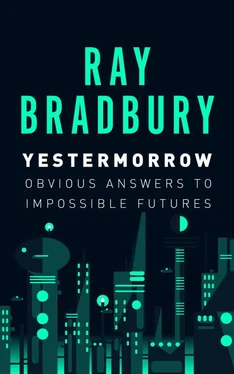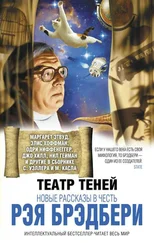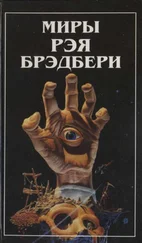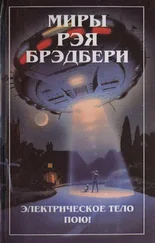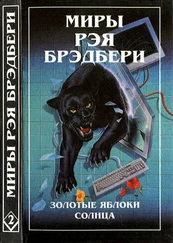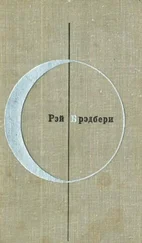“I’m running, thanks.”
“Oh, boy?” The boy stopped. Plato called, “Do you fear us now?”
“Oh, no, no. Thanks. Goodbye!”
“There,” said Plato, gently. “The boy’s gone. And we? Are we really here, my friends?”
“Yes and no. Good Plato, we are a mystery and a paradox. Let us speak on that.”
“Yes, even though we hear without hearing and tell without telling.”
The old men sat in the drowsy shade of eternal noon.
“Someone begin,” said Plato.
All talked at once.
“Much thanks,” I said, and I rose and changed seats and spoke to Sara Teasdale and Sir Beerbohm Tree. And I rose to go now with William Butler Yeats and take tiffin with Shakespeare as he gave me Richard’s first dark speech. So I moved around the endless table, breaking my fast with splendid words, meeting and basking with talented people reborn in robots to outlast time.
All this, Theater of the Future?
Yes, or one variety thereof.
What other shapes will Future Theater take?
Will it be truly new and exciting and alive? Will people swarm to it as they once swarmed, wild bees in need of pontifical-political-aesthetic honey?
Will multimedia grab it all and own it?
Will theater vanish into the darkness behind the silver screen only to reappear with larger vocal cords, bigger ears, wider body, vaster significance?
In other words, will everything become one big hard-rock festival, super-radio, Cinerama-TV Long-Playing Cinema?
Or can the quiet voice, well-articulated, small idea well ventilated, single actor well-educated and speaking very much alone and softly, prevail?
It is too early on in the twenty-first century to say.
One can guess, but one cannot truly tell.
I have guessed at the influence of holograms on our lives, in one instance.
By the sheerest of accidents I ran across some old friends one night a few years back. They were on their way to someone’s apartment, and invited me to come along to sit in on a séance with some newly invented “ghosts.”
Which is to say three-dimensional images tossed forth on the air before, or rather in, one’s eyeballs, shot there by the expert marksmanship of a laser-beam projector.
With my first view of these holographic ghosts, I thought, my God, how wonderful to come back once every fifty years for the next ten-thousand years to see what we’ll be up to in the Arts. We’ll be turning ourselves inside out, upside-down, wrongside-to with light, color, sound, and the speaking of previously unspeakable tongues! Lord give me that gift. Let me come back, let me hear and see and know!
In the year 2035, not so far off across the sill, I imagined a typical home where, white or cocoa-tinted (which will be very in that year) men, women, and children, will exercise rather than exorcise their “ghosts.”
The son summons up the Hound of the Baskervilles, which lurks in the shadows of his bedroom. It bounds forth, projected in three dimensions, by a laser-beam photo “emanator” hidden in his ceiling.
Simultaneously, the daughter calls for and is answered by Kathie, who rushes in a storm of snow, across the floor of her living quarters to vanish in the cold hills of Wuthering Heights.
The father speaks to and is answered by Hamlet’s Father’s Ghost, who rises in battlements and speaks memory and prophecy in one intonation.
The mother, kitchen-bound, is instructed by a three-dimensional holograph of a Cooking Witch, who appears in clouds of steam but vanishes in mists of spice.
Late at night, each person, attended by their own laser-ghost, beds down, touches a panel-button and sees first the Hound sink into the long grass of the Moor, then Kathie lost in storms, dwindling into the nap of the rug, then Hamlet’s Father turned to a mist within a mist, and the Cooking Witch with a last steam-kettle sigh, jackstraw heaping herself in a corner to melt, gone, all gone, and the time of sleep come.
Theater. Not just in a large house on a vast stage, but whispering at your ear, jiggling your elbow and your subconscious. Robot mosquitoes sizzling about your head as if it were a cider jug, repeating Pasts, advising Futures.
Theater.
What other ways will it walk in the years ahead?
During the past few years I have helped organize a Theater of Philosophy course at Santa Ana College. Within the classroom context, and occasionally using a semi-theater, we have begun plans to stage what was always a stage piece from the beginning: Plato’s Republic. Burgess Meredith appeared to dramatize sections of the books of Don Juan by Castaneda. I took off and flew around a bit with Kazantzakis’ religious/philosophical explosion, The Saviours of God. For the Future, the possibility of staging Shaw’s play Prefaces, with not just one but why not two Shaws on stage? Played by two actors engaged in verbal colics and amiable deliriums? Shaws I and II I call it; and I have finished a manuscript on this with Shaw Positive and Shaw Negative filling an evening with his Prefaces, his Musical Criticisms, his occasional despair with mankind, and his hopes for the Life Force and mouth-to-mouth breathing the Universe to survive.
What else up ahead?
Robot theaters of history. Rooms into which you walk to see humanoid machines seated under trees on a summer afternoon and walk over to sit with them and say, “Caesar, how go the Roman roads through Britain?” And he shows you. And: “Euripides and Aristotle, how does one write a play, a poem?”
And they tell you.
And you then trade wisdoms, your large one for their small ones, eh? And they treat you as a crony, as one of their bright crowd, which makes you grow and grow and grow.
What a wine press to lovingly crush a student in. Aristotle’s shoulder to one side, Euripides to the other, and —smunch! You’re educated by yammer and blab and gab.
Well, say you, since you speak of Future Theater, what have you, sir, done about it? Your plans, your ideas, your plays?
I toss my baggage in and travel with Shaw, who, I would like to think, might be amused at the company. The theater of ideas is my meat and drink, but, one hopes, without being ecclesiastical, without pontificating or browbeating. If an idea doesn’t surprise people and win them by passionate and entertaining means, you had best give up and go find a soapbox and install yourself on a street corner.
I have begun to write a series of plays about that future, which is no further off than one minute after midnight tonight. If we are to live in space for the next two billion years, give or take a million, then we must have reasons for doing so.
The propaganda for such theater can exist in many forms. I began my first experiments with this when the United States Pavilion people at the New York World’s Fair in 1964–65 asked me to create a ride in the top of the building. Circuiting the darkness on a traveling platform, five-hundred years of American history “happened” to the viewers wending their way through one hundred ten cinema screens of all sizes and shapes, accompanied by a narrator and a full symphony orchestra. It was my job to tell us what we were, what we are, and what we can hope to be. We were, I said, the people of the triple wilderness, who crossed a wilderness of sea to come here, a wilderness of grass to stay here, and now, late in time, move toward a wilderness of stars to live forever.
The metaphor worked. At the conclusion of our theatrical excursion, a thousand rocket ships took off in a furnace of fire to move toward Alpha Centauri and beyond, surrounding the audience with the passion and desire for flight and, hopefully, for the genetic survival of mankind at the end of that flight.
Theater? Of course it was. A variation of same. Even more theatrical was the enterprise that took me out to the WED Enterprises building in Glendale. The Disney Robot Factory, is what I call it, if they will forgive me.
Читать дальше
